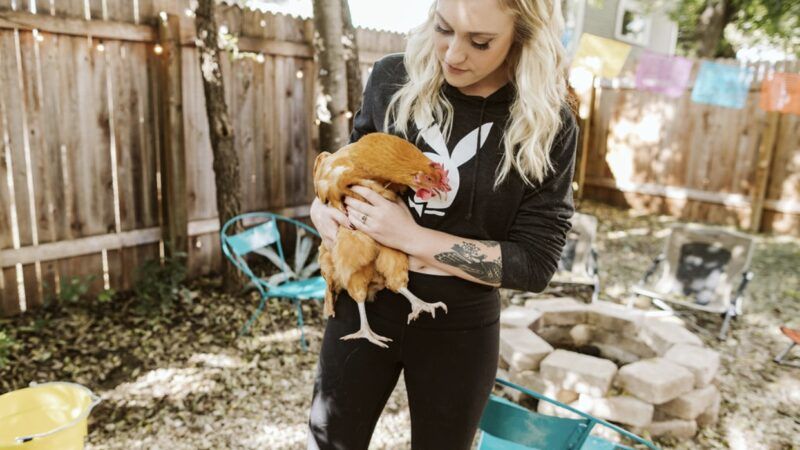How To Raise Backyard Chickens
The urban farming renaissance offers a little taste of self-reliance.

This Easter, we've hidden a dozen colorful, egg-centric stories across Reason.com. Hop around the site to find them—or click here to see them all in one basket.
Nowadays, in Manhattan, you'd be hard-pressed to find a pig. But around the middle part of the 19th century, there were some 50,000 pigs raised on the island. Though urban farming is far less common in 2025, it still exists, more frequently for hobby rather than sustenance: Chickens are the animal of choice, with beekeeping also experiencing a renaissance.
Urban farming is derided by its critics as smelly and unnecessary. I beg to differ. I used to live in dense East Austin, Texas, and kept a manageable flock of five chickens. As a baker who makes custards and meringues and cakes, I looked at chicken keeping as less a cost-saving measure and more as a means of ensuring my ingredients would be high-quality. It was also a way to become more self-reliant, a modicum more grateful for how food ends up on my plate.

So you think you want to raise chickens! Here's some stuff to know.
- Like children, they're beautifully scaleable: You should not raise one or two; they're flock animals in need of companionship. Start with four or five, and see if you want to expand.
- The egg-laying years are short: They start laying around five or six months, and their fertility slows around 3 years old, ending at around 6 or 7 years old. They can live up to 10 years, so you may have a few years during which they're not laying, but you can't put them out to literal pasture.
- Fear not, they may not live that long: You must keep them quite safe from predators (raccoons, dogs, foxes, coyotes, even owls and snakes) and from disease. My dog attacked my chickens once, and several raccoons attempted. Nature is tough, man.
- To keep them healthy, you'll need a coop and some feed; a source of fresh water; things like diatomaceous earth to sprinkle in their bedding (which tends to be wood shavings); ground-up oyster shell as a source of calcium to improve their eggshell quality.
Some localities are much more amenable to it than others: New York, Chicago, Austin, Houston, Dallas, Atlanta, Portland, and Seattle all allow residents to raise backyard flocks, provided they're not harboring roosters. Reason's illustrious Zach Weissmueller keeps chickens in Jacksonville, Florida. My cousins kept them in Venice, Los Angeles. Most cities are fine with it!
Some—Fort Wayne, Indiana; Yonkers, New York—ban it outright. Detroit makes you get a license. Lots of cities place reasonable rules on backyard farmers: San Francisco says you can generally have no more than four chickens; Oakland and Berkeley dictate that chicken keepers locate their flock a reasonable distance from neighbors. As a young whippersnapper, I thought any infringement on one's right to keep chickens was basically tyranny; now, I'm more sympathetic to the little regulations that attempt to balance the rights of property owners with the externalities created that might piss off neighbors.
These days, I live in New York City, in the southernmost part of Queens next to the ocean where the buildings space out and the swell seeps in; future chicken keeping is, for now, a dream deferred. But I crave the self-reliance chicken keeping represents: The ability to have a high-quality protein source constantly available, to know exactly how my eggs are sourced, to regularly behold the miracles and vagaries of nature. Most of all, to feel a sense of gratitude every time I crack open an egg; an appreciation for the creature that produced it, and the work—theirs and mine—that goes into each one.


Show Comments (39)